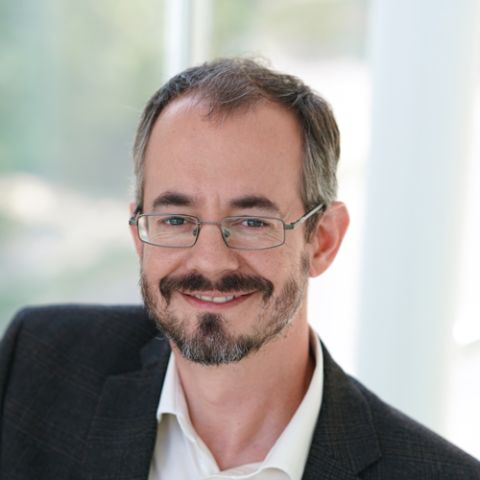Join us at the forefront of cancer research
Study the mechanisms involved in cell cycle control. Investigate genes and pathways that contribute to tumorigenesis. Define new biomarkers for better diagnosis and risk assessment. Identify novel targets for therapeutic intervention.
When you choose the Cancer Genomics and Computational Oncology (CGCO) PhD track at Roswell Park, you’ll focus on laboratory research and/or bioinformatics, with a thesis project involving independent research at the frontiers of current knowledge. The interdisciplinary nature of this track will prepare students to collaborate effectively with researchers from diverse fields.
We have both a large, friendly faculty and a high faculty-to-student ratio. We’re looking for dedicated students with high drive and curiosity and substantial background in biology, chemistry, statistics, or computer science.
Start your application Meet our team Program of study
Track highlights
The Cancer Genomics and Computational Oncology Track emphasizes cutting-edge basic and translational research, conducted using both experimental and computational approaches, performed with outstanding scientific rigor and reproducibility, leading to high quality publication of students’ work.
Students in CGCO track can choose between two concentrations of course work: a Cancer Genetics and Genomics concentration, or a Computational Oncology concentration. Both concentrations will gain some expertise in bioinformatics, but the Computational Oncology concentration students will get further in-depth training in computational biology.
We stress critical evaluation of published data through our journal clubs and acquisition of oral communication skills through seminar courses. You’ll also participate in professional development by attending international conferences and presenting your research.
Research areas
Faculty research interests cover a broad spectrum of cancer genetics and molecular biology, with exceptional strengths in:
- Isolation and characterization of cancer genes
- Somatic cell genetics
- High-throughput genomics and epigenomics
- Mouse genetics and mouse models of cancer
- Epigenetic and cell cycle regulation in cancer
- Oncogenic signaling pathways and metabolic changes in cancer
- Computational biology and bioinformatics in cancer research
- Biomedical informatics in cancer research
- Statistical analysis and machine learning in oncology
- Tumor heterogeneity and evolution
First author articles from recent graduates:
| Student | Year Graduated | Mentor | First Author Publication |
|---|---|---|---|
| Hayley Affronti | 2018 | Dr. Smiraglia | PubMed |
| Charles Manhardt | 2018 | Dr. Lau | PubMed |
| Laura Prendergast | 2019 | Dr. Gurova | PubMed |
| Sejin Chung | 2019 | Dr. Knudsen | PubMed |
| Eric Irons | 2019 | Dr. Lau | PubMed |
| Patrick Punch | 2020 | Dr. Lau | PubMed |
| Ashley Mussell | 2020 | Dr. Shang | PubMed |
| Spencer Rosario | 2020 | Dr. Smiraglia | PubMed |
| Renyuan Zhang | 2022 | Dr. Nastiuk | PubMed |
| Justine Jacobi | 2023 | Dr. Smiraglia | PubMed |
Additional information about our research can be found on our individual faculty pages.
The educators, mentors and students at Roswell support and push each other to be the best they can be. They work to generate a sense of community that is open, inclusive, and encouraging all while performing some of the most translational research. The small class size and outstanding education you receive at Roswell provides a stimulating learning experience that lays an excellent foundation for your success as a scientist in cancer research.Hayley Affronti, PhD, Class of 2018
Program of study
Fall (19 credit hours):
- Integrated Cancer Sciences I/II (RPG 501/502) (4 credit hours each = 8 credit hours) (Mon-Fri, 8:30-10:30 a.m.)
- Biostatistics for Cancer Sciences (RPG 519) (4 credit hours) (Tues, Thur, 12-1:30 p.m.)
- Responsible Conduct of Research (RPG 504) (1 credit hour) (Tues, 3-4 p.m.)
- First-Year Student Journal Club (RPG 601) (2 credit hours) (Fri, 1-3 p.m.)
- Independent Study (RPG 514) (8 credit hours)
Spring (19 credit hours):
- Integrated Cancer Sciences III (RPG 503) (4 credit hours) (Tue, Thur, Fri, 4-5 p.m.)
- Required Elective – see below
- Principles of Computational Oncology (RPG 520) (4 credits) (Mon, Wed, Fri, 9-10:30 a.m. ONLY IF Bioinformatics HEAVY electives planned)
- Graduate Seminar (RPG 521) (2 credit hours) (Wed, 4-5 p.m.)
- Research (RPG 606) (x credit hours to hit 19)
Fall (15-19 credit hours depending on electives):
- Regulatory Mechanisms (RPG 525) (4 credit hours) (Tues, Thur, 9-10:30 a.m.)
- Basics of Grantsmanship I (RPG 603) (2 credit) (Wed, 9 a.m.-noon)
- Graduate Seminar (RPG 521) (2 credit hours) (Wed, 4-5 p.m.)
- Optional Elective(s)
- Research (RPG 608) (x credit hours)
Spring (9-10 credit hours depending on electives):
- Principles of Computational Oncology (RPG 520) (4 credit hours) (Mon, Wed, Fri, 9-10:30 a.m., unless already taken)
- Optional Elective(s)
- Graduate Seminar (RPG 521) (2 credit hours) (Wed, 4-5pm)
- Research (RPG 608) (5 credit hours)
Preliminary Exam – cycle 2 over the summer.
66 credits completed after 4 semesters (adjust research credits according to electives taken) with 6 more to go for the remaining 6 semesters.
Fall:
- Research (RPG 608) (1 credit hour)
- Graduate Seminar (non-registered) (Wed, 4-5 p.m.)
Spring:
- Research (RPG 608) (1 credit hour)
- Graduate Seminar (non-registered) (Wed, 4-5 p.m.)
Bioinformatics LITE:
RPG 543 Tools and Models of Molecular Oncology – 4 credits, Spring Year 1 (Tues, Thur, 1-2:45 p.m.)
Bioinformatics PLUS:
BCH 519 Bioinformatics and Computational Biology – 3 credits, Spring Year 1
BMI 503 Biomedical Informatics – 3 credits Fall Year 2 (Some other stats/data analysis elective to be determined - 3 credits - could be online course Spring Year 2)
Bioinformatics HEAVY:
EAS 503 Programming and Database Fundamentals for Data Scientists – 3 credits Spring Year 1
BIO 504 Adv Molecular Genetics – 4 credits Spring Year 1 (if strong math/weak bio background)
MTH 309 Introductory Linear Algebra – 4 credits Summer Year 1 (if strong bio/weak math background)
STA 545 Statistical Data Mining I – 3 credits Fall Year 2 (requires Linear Algebra)
STA 546 Statistical Data Mining II – 3 credits Spring Year 2
How to apply
Contact us
Jennifer Panaro
Track Coordinator
Phone: 716-845-1929
Email: Jennifer.Panaro@RoswellPark.org

